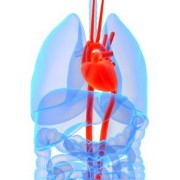 Photo: Getty Images
Photo: Getty Images
It’s long been accepted that obesity is a leading contributor to the development of heart disease. Now, researchers from the Sanford-Burnham Medical Research Institute (Sanford-Burnham) believe that they now have a better understanding of why obesity, and the fat cells that come with it, may be damaging to heart health. The key to the mystery lies within understanding the relationship between the hormone adiponectin and T-caderhin.
In the past, fat tissue was simply viewed as a fat storage facility. Researchers now believe that fat tissue is much more. It’s actually a producer of adiponectin. Adiponectin is a hormone which is known for providing protective, heart-healthy benefits, including protecting the heart from damage caused by stress. It may be difficult to think of fat in terms of “good” versus “bad” but when it comes to the presence of adiponectin, not all fat is created equal. In healthy fat tissue (such as in found in those who maintain an ideal weight), adiponectin levels are plentiful. However, in unhealthy fat tissue (such as in found in the fat tissue of those who are overweight or obese), adiponectin levels are significantly lower. This disparity in the presence of adiponectin levels is cause for concern because insufficient levels have been linked to the development of stroke and heart disease.
In previous clinical studies, researchers observed that T-cadherin was present in the heart. (The previous clinical studies were examining T-cadherin from the perspective of its role in the development of certain cancers and in brain development.) In the current study, researchers genetically engineered mice and removed T-cadherin. Without the presence of T-cadherin, researchers found that adiponectin was unable to bind to the heart. When subjected to cardiac stressors, the mice suffered heart damage. Researchers also examined the impact of cardiac stress on mice which lacked both T-cadherin and adiponectin hormone. Previously, administering adiponectin to mice lacking in the adiponectin hormone only was shown to reverse heart damage. However, in mice lacking both t-cadherin and adiponectin, administering adiponectin had no impact and the heart damage was not reversed.
As a result of the information gathered in the study, researchers believe that the presence of T-cadherin is key to the proper functioning of adiponectin and its success in providing protective benefits to the heart.
The study results were published in The Journal of Clinical Investigation (Nov. 1, 2010 edition).
Source:
Sanford-Burnham Medical Research Institute (2010, November 1). Study finds fat hormone's long-sought link to heart protection. ScienceDaily. Retrieved November 7, 2010, from http://www.sciencedaily.com¬ /releases/2010/11/101101093602.htm
Journal Reference:
1. Denzel MS, Scimia M-C, Zumstein PM, Walsh K, Ruiz-Lozano P, Ranscht B. T-cadherin is critical for adiponectin-mediated cardioprotection in mice. Journal of Clinical Investigation, 2010; DOI: 10.1172/JCI43464





Add a CommentComments
There are no comments yet. Be the first one and get the conversation started!